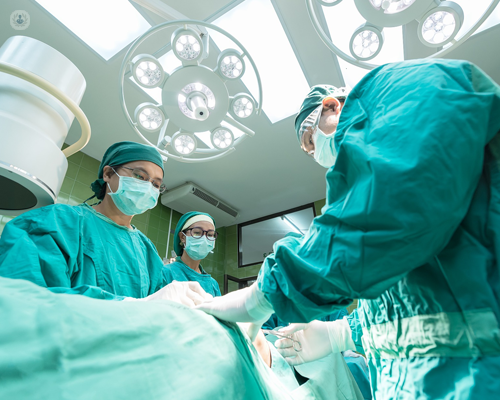Thyroid surgery: Benefits, side effects and recovery time
Written in association with:Thyroid surgery is performed in order to remove one's thyroid gland and is a very effective treatment option when it comes to thyroid disorders, such as cancer.
In this informative interview, highly experienced Leicester-based consultant general surgeon Mr Atul Bagul details both the benefits and potential complications with regards to undergoing thyroid surgery.

Who may need to have thyroid surgery?
There are different reasons why a patient may need thyroid surgery. The thyroid is a gland which makes a hormone called thyroxine. So, the first reason it could be required is:
- It's a benign lesion. This means there's no cancer, but the gland is hyperactive making a lot of excess hormones. The aim is to treat the symptoms, i.e. take the thyroid gland out.
The second reason thyroid surgery is required is that:
- Because the gland is again enlarged, it's benign, and in medical terms we call it goitre. This is to treat the symptoms associated with an enlarged gland, such as compression of the windpipe which affects your breathing and swallowing, or the lump and the size itself.
The third reason could be because
- The thyroid gland has a lump in it. This raises suspicion of cancer, or it's proven cancer and the aim is to take out the thyroid gland so as to treat the thyroid cancer.
What are the benefits of the procedure?
The benefits of this surgical procedure are to:
- clear the symptoms, and secondly;
- to treat any cancer, if it's because of this.
Are there any negative side effects?
Some patients can complain of post-operative discomfort. This usually settles down by taking simple painkillers, but of course, there are associated risks with any surgical procedure. The incidence of these is low, and it could be because of damage to surrounding structures like the blood vessels, and nerves. If the nerve gets damaged it can affect the voice; but this is under one per cent, i.e. less than one in 100 per cent of patients getting symptoms from it.
Then, you may require thyroxin supplements or calcium supplements. Some people can experience issues with scarring, so scar tissue can be an issue. You can also have complications such as fluid collections in the neck.
Is the procedure safe?
Yes, the procedure is safe. It's associated with low risk, but what we have to remember is, no surgical procedure is associated with zero per cent risk. Comparative to other surgical procedures, the risks are low and the recovery is quick.
What's the recovery period like after thyroid surgery?
Usually, this procedure is done as an overnight stay procedure. The following day, after the blood tests are checked, the drain is removed if people have one, and the stitch is removed then you can go home. Most people get back to normal day-to-day activities a few days after.
Is it possible to live a normal, healthy life after undergoing thyroid surgery?
Yes. The whole aim of the surgical procedure is to cure the disease process. Of course, depending on the disease process, you may need extra treatment such as:
- thyroxin supplements;
- radioactive iodine therapy.
And you will need a routine follow up so that you can keep an eye on things, especially if the surgical procedure was in relation to cancer surgery.
If you're concerned about your thyroid and are considering undergoing thyroid surgery, you can consult directly with Mr Bagul today, via his Top Doctors profile.


